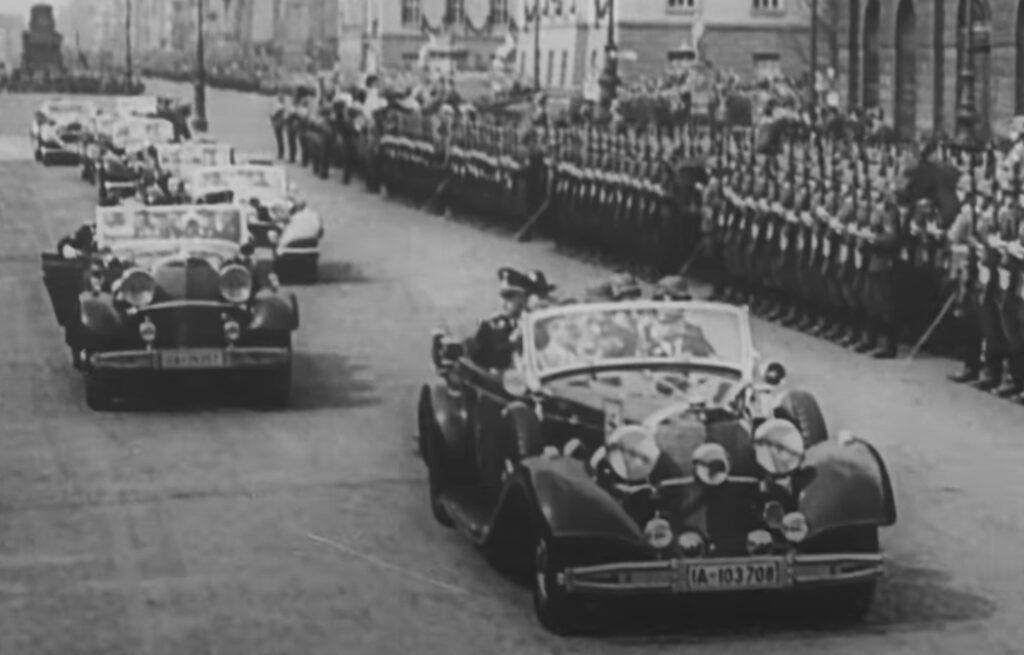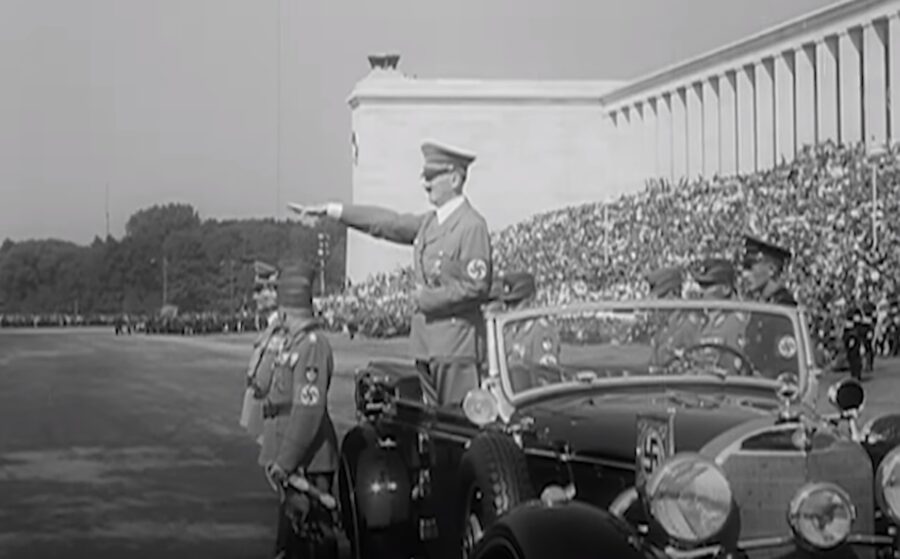Mercedes-Benz as an iconic automobile brand Mercedes-Benz, a renowned German automobile manufacturer, holds a storied legacy in the automotive industry. Established in 1926 through the merger of Daimler-Motoren-Gesellschaft and Benz & Cie, the company has been synonymous with luxury, innovation, and engineering excellence. With a rich heritage of producing high-quality vehicles, Mercedes-Benz has become a symbol of elegance, performance, and prestige.
Germany during Hitler’s regime To fully comprehend the role of Mercedes-Benz during Hitler’s regime, it is crucial to understand the historical context in which the company operated. Adolf Hitler’s rise to power in Germany in 1933 marked the beginning of a tumultuous era defined by the totalitarian rule of the Nazi Party. The regime implemented policies based on extreme nationalism, anti-Semitism, and the pursuit of autarky, aiming to transform Germany into a dominant global power.
Examining the role of Mercedes-Benz during Hitler’s regime carries significant historical and ethical implications. As an iconic brand deeply ingrained in German society, Mercedes-Benz’s actions and involvement during this dark chapter of history warrant scrutiny. Understanding the company’s relationship with the Nazi regime sheds light on the complex dynamics between industry and authoritarian governments, as well as the moral responsibilities of corporations in times of political upheaval. By delving into this topic, we can learn valuable lessons about the ethical dimensions of business operations and the importance of corporate responsibility in the face of oppressive regimes.
Mercedes-Benz under Hitler’s Regime
Mercedes-Benz’s Association with Nazi Ideology
Relationship between Mercedes-Benz and the Nazi Party During Hitler’s regime, Mercedes-Benz had a complex relationship with the Nazi Party. While the company was not officially affiliated with the party, it did align itself with Nazi ideals to secure its position within the German automotive industry. Executives, including company founder Gottlieb Daimler’s son, Paul Daimler, held membership in Nazi organizations, signaling a degree of cooperation.

Utilization of Mercedes-Benz vehicles for propaganda purposes The Nazi regime recognized the power of Mercedes-Benz’s brand and reputation. The company’s vehicles were prominently showcased in Nazi propaganda, symbolizing German engineering superiority and the image of a modern, prosperous Germany. Mercedes-Benz cars were used during parades, rallies, and official events to showcase the regime’s perceived strength and prestige.
Mercedes-Benz’s Production During The War
Transformation of production facilities for wartime purposes As Germany prepared for war, Mercedes-Benz, like many other German companies, retooled its production facilities to support the war effort. The company shifted its focus from luxury cars to military production, adapting factories to manufacture tanks, aircraft engines, and other war-related equipment. This transition allowed Mercedes-Benz to contribute significantly to the Nazi war machine.
Military contracts and production of military vehicles Mercedes-Benz secured numerous military contracts during Hitler’s regime, playing a crucial role in supplying vehicles to the German armed forces. The company manufactured a wide range of military vehicles, including trucks, staff cars, armored cars, and reconnaissance vehicles. The reliability and performance of Mercedes-Benz vehicles made them a preferred choice for the military.
Expansion of the Mercedes-Benz Brand through Forced Labor
Forced labor practices during Hitler’s regime Hitler’s regime relied heavily on forced labor, which included millions of prisoners of war, political prisoners, and civilians from occupied countries. Mercedes-Benz, like other German companies, utilized forced labor in its factories. Thousands of individuals were subjected to harsh working conditions, exploitation, and inhumane treatment.
Involvement of forced laborers in Mercedes-Benz factories Forced laborers were employed in various capacities within Mercedes-Benz factories, contributing to the company’s wartime production. These individuals worked in manufacturing, assembly, and maintenance roles, enduring grueling conditions and suffering physical and emotional hardships. The use of forced labor allowed Mercedes-Benz to meet production demands while exploiting vulnerable individuals.
Mercedes-Benz and Hitler’s Leadership
Hitler’s Personal Relationship with Mercedes-Benz
Hitler’s admiration for Mercedes-Benz vehicles Adolf Hitler had a personal affinity for Mercedes-Benz automobiles. He regarded them as symbols of German engineering prowess and excellence. Hitler often expressed his admiration for the company’s luxury cars, especially the prestigious Mercedes-Benz models such as the Mercedes-Benz 770, also known as the “Grosser Mercedes.” He considered these vehicles a reflection of his own status and power.

Use of Mercedes-Benz vehicles by Hitler and high-ranking officials Hitler and other high-ranking Nazi officials frequently utilized Mercedes-Benz vehicles for their transportation needs. These vehicles provided an aura of prestige and conveyed an image of authority. The fleet of Mercedes-Benz cars served as a visual representation of Hitler’s leadership and the regime’s grandeur during public appearances, parades, and state functions.
Mercedes-Benz’s Involvement in Hitler’s Motorization Program
Implementation of the “Strength through Joy” initiative Mercedes-Benz played a significant role in Hitler’s ambitious motorization program, particularly through its participation in the “Kraft durch Freude” (Strength through Joy) initiative. This program aimed to increase car ownership and promote leisure activities among the German population. Mercedes-Benz manufactured affordable cars, such as the Volkswagen Beetle, to make automobile ownership more accessible to the masses.
Mercedes-Benz’s role in shaping Hitler’s vision of a motorized society Hitler envisioned a motorized society that would facilitate the economic and military advancement of Germany. Mercedes-Benz’s expertise in automobile manufacturing and engineering greatly contributed to the realization of this vision. The company’s production capabilities, technological advancements, and association with the Nazi regime positioned Mercedes-Benz as a key player in shaping Hitler’s motorization agenda.
Legacy and Reflections
Post-War Consequences for Mercedes-Benz
Denazification and rebuilding of the company After World War II, Mercedes-Benz, like many other German companies, underwent denazification processes. Former executives who had been involved with the Nazi regime were removed from their positions. The company had to rebuild its leadership and establish a new direction for the post-war era. Efforts were made to distance the brand from its associations with the Nazi period.
Reparations and restitution to victims of forced labor In recognition of the harm caused by forced labor during Hitler’s regime, Mercedes-Benz, along with other German companies, has engaged in reparations and restitution efforts. The company has made financial contributions and provided compensation to former forced laborers and their families. These actions aim to acknowledge the suffering endured by those affected by forced labor practices.
Historical Reflections on Mercedes-Benz’s Involvement
Ethical considerations surrounding corporate collaboration with oppressive regimes Mercedes-Benz’s involvement during Hitler’s regime raises important ethical considerations. It prompts reflection on the role of corporations in times of political oppression and the responsibilities they bear. The collaboration between Mercedes-Benz and the Nazi regime raises questions about the balance between business interests, societal impact, and moral obligations. It serves as a cautionary tale and a reminder of the need for corporate accountability and ethical decision-making.
Lessons learned and impact on Mercedes-Benz’s corporate culture The experience of Mercedes-Benz during Hitler’s regime has had a lasting impact on the company’s corporate culture. The recognition of its historical involvement has spurred efforts to promote transparency, responsibility, and human rights within the organization. Mercedes-Benz has implemented initiatives to ensure ethical practices, sustainability, and respect for human dignity, seeking to learn from the past and contribute positively to society.
Conclusion
Mercedes-Benz’s role during Hitler’s regime was multi-faceted. The company had associations with the Nazi Party, utilized its vehicles for propaganda, transformed its production for wartime needs, and expanded its brand through forced labor practices. The personal relationship between Hitler and Mercedes-Benz, as well as the company’s involvement in Hitler’s motorization program, further illustrate its significance during this period.
Examining Mercedes-Benz’s role during Hitler’s regime highlights the significance of understanding history to inform our present and shape a better future. It serves as a reminder of the potential consequences of corporate collaboration with oppressive regimes and the ethical considerations that should guide business practices. By studying the past, we can learn valuable lessons that help us make informed decisions and foster responsible actions in contemporary times.
Acknowledgment of Mercedes-Benz’s evolution and commitment to responsibility It is essential to acknowledge that Mercedes-Benz has evolved since the time of Hitler’s regime. The company has undergone denazification, contributed to reparations, and demonstrated a commitment to responsibility. Mercedes-Benz has recognized the ethical implications of its past actions and has taken steps to promote transparency, sustainability, and respect for human rights. This ongoing evolution showcases the company’s dedication to learning from history and shaping a corporate culture grounded in ethical principles.
In conclusion, the examination of Mercedes-Benz’s role during Hitler’s regime provides insight into the complexities of the company’s historical involvement. Understanding this history allows us to reflect on the ethical dimensions of corporate behavior, learn from the past, and appreciate the efforts made by Mercedes-Benz to embrace responsibility in the present and future.



